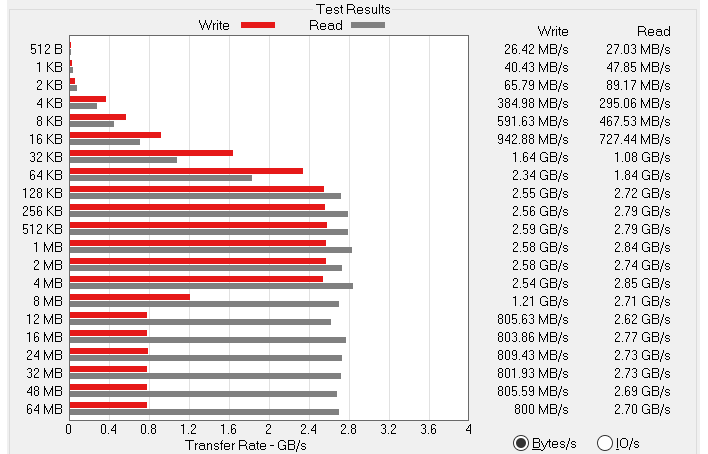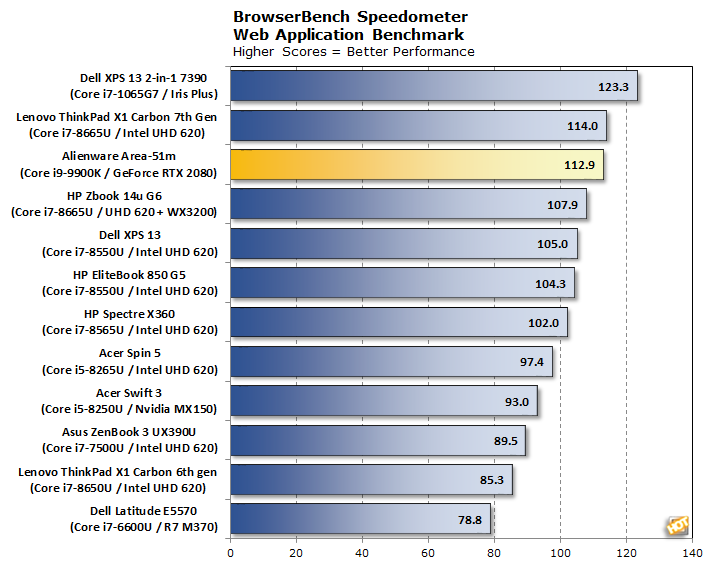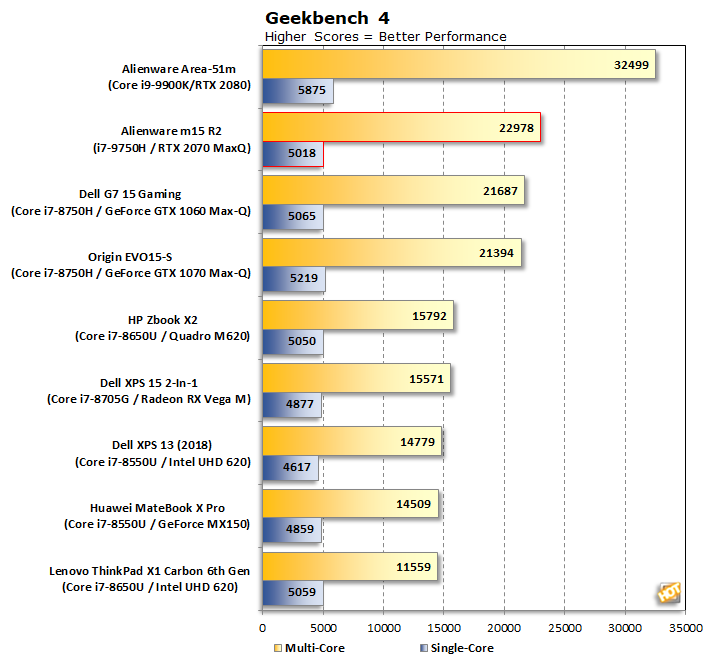Alienware m15 R2 Review: Beautiful OLED, Beastly Performance
|
ATTO's venerable disk benchmark gives us an idea of how well the system's SSD performs with sequential read and write operations of differing sizes. This system has a 512 GB Toshiba XG5 NVMe solid state disk with four lanes of PCI Express 3.0 connectivity. Those specs look good on paper, but let's see how it performs.

Read performance is very solid as we can see that the Toshiba SSD consistently hits 2.75 GB per second. Writes are a different story, however, as the drive chugs along great for the first several parts of the test and then drops precipitously at the end. This behavior persisted across multiple runs, too. Some runs dropped at smaller block sizes than others. We don't know for sure, since Toshiba doesn't publish specs for this drive, but it appears that maybe this drive has an SLC caching system, or perhaps it's hitting a thermal limit (although the drive is wrapped in a copper heat spreader), but either way the issue only seems to affect sustained writes. Once the test finishes the drive returns to normal quickly, however, as performance is fine at the start of the next run. At any rate, we don't think anybody will notice much of a difference in day to day use.
|
We recently moved on to BrowserBench.org's Speedometer test, which takes a holistic look at web application performance. This test automatically loads and runs several sample webapps from ToDoMVC.com using the most popular web development frameworks around, including React, Angular, Ember.js, and even vanilla JavaScript. This test is a better example of how systems cope with real web applications, as opposed to a pure JavaScript compute test like JetStream. All tests were performed using the latest version of Chrome.

Considering the burst-heavy nature of most web apps and the fact that all of the CPUs listed hit roughly the same maximum turbo boost speeds, performance is right about where we'd expect with the m15 R2. We don't put too much stock in the fact it didn't quite catch the ThinkPad X1 Carbon. The separation is very much within the margin of error for this test, so this is a good result.
|
Geekbench 4 is a cross-platform benchmark that simulates real world processing workloads in image processing and particle physics scenarios. We tested the notebooks featured here in Geekbench's single and multi-core workloads.

Performance again is right what you'd hope for. Both the Core i7-8750H in the older gaming systems and the Core i7-9750H in the m15 R2 have six cores with twelve hardware threads thanks to Hyper-Threading. On the other hand, the Intel Core i9-9900HK has the same eight cores and sixteen threads of the desktop 9900K, so it's no surprise it passes the Core i7s on this test.
|
Cinebench R15 is a 3D rendering benchmark that tests both the CPU and GPU engines in the processor. Cinebench is developed by Maxon, which is better known for its Cinema 4D software employed in professional 3D rendering and animation studios. We use both of Cinebench’s integrated tests for CPU and GPU.

In the older Cinebench R15, CPU scores are roughly what we'd expect. Alienware's m15 R2 surpasses the other six-core CPUs in this relatively quick (on modern CPUs) test. On the other hand, the system's OpenGL was considerably slower than any other Turing-based GPU solution, and even trailed bigger Pascal chips. This persisted across multiple runs, and lowering the desktop resolution didn't make any difference. We doubt folks are buying these systems for professional rendering use cases, so as long as gaming performance is good we're not too worried.

Cinebench R20 drops the graphical test entirely, so we trade out OpenGL for a single-threaded rendering test. Thanks to having six cores, the Core i7-9750H chews through this test much faster than any of the quad-core systems. The only result we have that was faster is the eight-core Core i9-9980HK from the most recent Dell XPS 15. This perfectly aligns with what we'd expect. Single-threaded performance is equally good, as it's much faster than the Whiskey Lake Refresh 8th gen CPUs, and only trails Intel's Ice Lake Core i7-1065G7 and the Core i9-9980HK with its 11% faster maximum turbo speed.
Next up let's see how the Alienware m15 R2 performs in PCMark and 3DMark.







